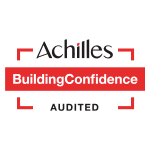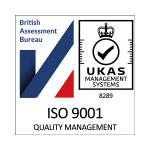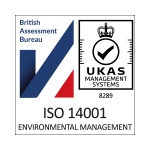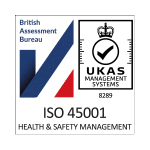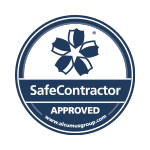If you work in construction, you will most likely have heard about the Construction Industry Research and Information Association (CIRIA).
They are an not-for-profit organisation and their work ranges from biodiversity enhancements on building sites, to creating a framework for reducing risk from unexploded bombs (UXBs).
Approximately 450,000 high explosive bombs were dropped on Britain during WWII, and roughly, 10% did not explode on impact – which represents a significant risk to construction sites and developers working in major cities across the UK.
There is also a viable risk of explosives being left over or buried from allied action, such as ordnance manufacturing and Home Guard activities – which could cause a UXO incident during a construction or development project.
Surprisingly, there is no UK legislation defining the steps developers must take to check for UXO risk before construction or development work begins. However, there are legal obligations under the Health and Safety at Work Act 1974 and CDM2015 to make sure the health and safety of employees is ensured at all time.
This is where CIRIA C681 plays it part, as they have created an industry guide for the management of risk associated with UXO.
The four stages of CIRIA C681 are:
- Preliminary UXO Risk Assessment
- Detailed UXO Risk Assessment
- UXO Risk Management
- UXO Support
Breaking down CIRIA C681
The first step in any risk mitigation plan is to get in contact with a UXO Specialist, like ourselves, who can help walk you through the various stages of CIRIA C681. 1st Line Defence hires a team of ex-military personnel, who use their vast experience from the British Army, Royal Navy and Royal Air Force to mitigate the risk of UXO.
1. Preliminary UXO Risk Assessment
UXO Specialists begin with a Preliminary UXO Risk Assessment to determine a risk level for your site. They investigate any military activity on or near your site to calculate the likelihood of you encountering UXO, presenting you with a risk rating – and whether any further action is required.
If your site returns a ‘Low’ risk rating after the assessment, this is deemed ‘acceptable’ and you can continue with your project. However, if it comes back as ‘High’ or ‘Medium’, you will need to take further action – and commission a Detailed UXO Risk Assessment.
2. Detailed UXO Risk Assessment
If historic research indicates a risk then further investigation is required, and the research team will investigate how any military action could have led to UXO contamination on your site through a Detailed UXO Risk Assessment. With detailed modelling and granular research, 1st Line Defence can potentially ascertain the type of UXO that could be on your site – and how deeply it would have penetrated the soil.
3. UXO Risk Management
Our senior UXO Specialists will work together with you to find the most appropriate solution to the problem. If a viable solution cannot be identified, then you may have to make changes to your development plan. Fortunately, 1st Line Defence are usually able to find workable solutions that take your project budget and site characteristics into account.
4. UXO Support
Our UXO engineers will be dispatched to your site to implement the rest of the UXO Risk Management plan. This could involve a Non-intrusive UXO Survey, with drones, carts or towed-array magnetometer systems used to identify ferrous materials without disturbing the ground.
Alternatively, we might deploy one of our Intrusive UXO Survey rigs to site, which allows us to clear piles up to 25m beneath the ground and model targets in three dimensions – or send a UXO Specialist to closely monitor any excavations taking place.
If any anomalies are discovered, we will adjust the UXO Risk Management plan and conduct a thorough investigation/disposal process.
Why should I hire 1st Line Defence?
1st Line Defence have been working in the UXO sector for 10+ years and we provide a wide range of UXO Services, serving the UK and Overseas. If you would like more information or some general advice, contact us on +44 (0) 1992 245020 or info@1stlinedefence.co.uk and we will be happy to help.
